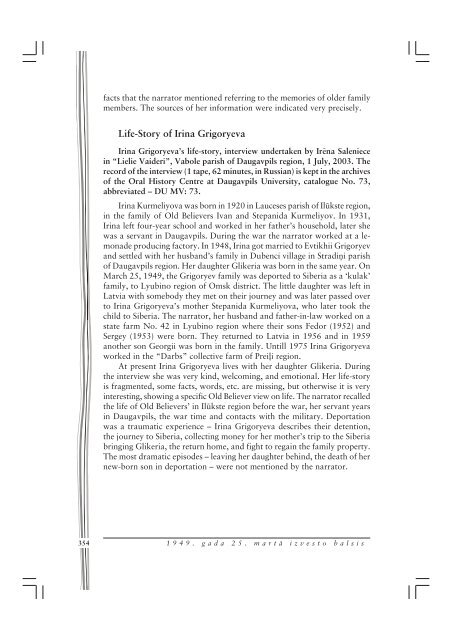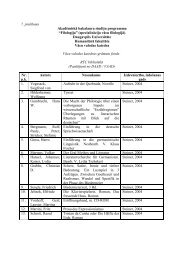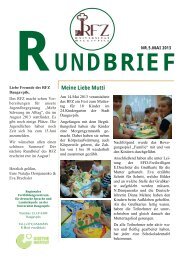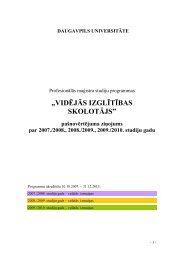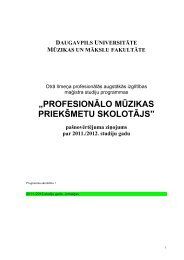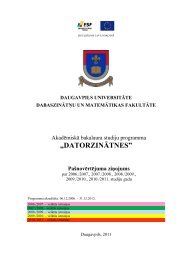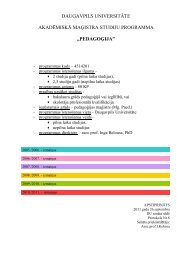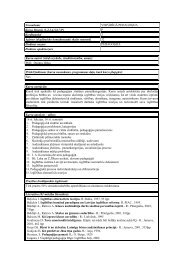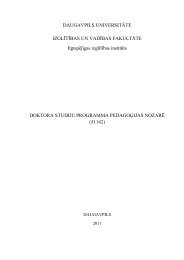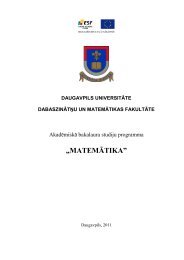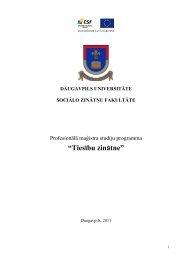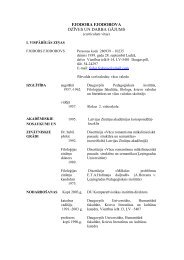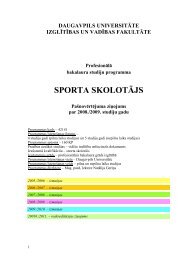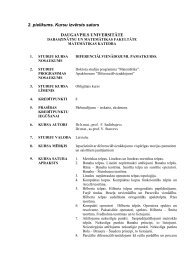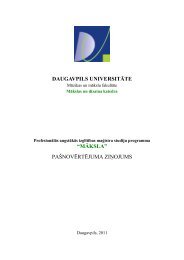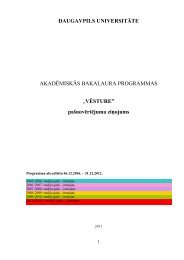- Page 1 and 2:
Daugavpils Universit‚te 1949. gad
- Page 3 and 4:
Saturs Priekapplev‚rds ..........
- Page 5 and 6:
PRIEK-V¬RDS Kr‚jums ì1949. gada
- Page 7 and 8:
Ieklausoties izvesto balsÓs Mutv
- Page 9 and 10:
13. lp.]. Lai gan s˚dzÓba palika
- Page 11 and 12:
gan pret teicÁjiem, gan intervÁt
- Page 13 and 14:
izs˚tÓjuma viet‚). Cik var nopr
- Page 15 and 16:
пом. - помощник ñ palÓ
- Page 17 and 18:
da˛‚du aspektu maksim‚li prec
- Page 19 and 20:
[..] Tad ar smag‚m maappleÓn‚m
- Page 21 and 22:
8. Zelmas Redzobas (Kalv‚nes) dz
- Page 23 and 24:
100 23. dokuments (LVA, 1894. f., 1
- Page 25 and 26:
ArhÓva izziÚa par Grigorjevu Ïim
- Page 27 and 28:
GlikÁrijas Muk‚nes (Grigorjevas)
- Page 29 and 30:
m‚sa. Tad mani nog‚d‚ja pie t
- Page 31 and 32:
ñ Bija, bija, bija.. j‚! M˚su p
- Page 33 and 34:
ñ Sav‚ m‚j‚? ñ J‚, sav‚
- Page 35 and 36:
ñ ViÚa daudz p‚tarus tur vis‚
- Page 37 and 38:
ciÚus, brauc‚m uz ezeru, kaut uz
- Page 39 and 40:
ñ Un sabiedriskas... ñ [P‚rtrau
- Page 41 and 42:
ворон так летал над
- Page 43 and 44:
es par to gr‚matvedes palÓgu str
- Page 45 and 46:
ñ SirsnÓgi? ñ SirsnÓgi, j‚. E
- Page 47 and 48:
Irinas Grigorjevas dzÓvesst‚sts
- Page 49 and 50:
пиного брата, был д
- Page 51 and 52:
- Компот? Ну вот ран
- Page 53 and 54:
динка была, и тогда
- Page 55 and 56:
- А как Вы попали в г
- Page 57 and 58:
надо, на ночь отсту
- Page 59 and 60:
[Audiokasetes B puse] - ... и то
- Page 61 and 62:
- До войны... не помн
- Page 63 and 64:
плену. Батька тоже
- Page 65 and 66:
неё готовый [домик]
- Page 67 and 68:
да, председатель ко
- Page 69 and 70:
1. Izvest‚s Grigorjevu Ïimenes u
- Page 71 and 72:
1 T‚ dokument‚, pareizi ir ìЛ
- Page 73 and 74:
5. dokuments (LVA, 1894. f., 1. apr
- Page 75 and 76:
НАШЕЛ: Согласно реш
- Page 77 and 78:
7. 1949. gada 25. marts, [ceÔ‚ u
- Page 79 and 80:
8. dokuments U z s k a i t e s l i
- Page 81 and 82:
Григорьев Ефим 2 Фе
- Page 83 and 84:
17. Был ли за границе
- Page 85 and 86:
1 T‚ dokument‚. V‚rd‚ “о
- Page 87 and 88:
15. ar tintes pildspalvu. Dokumenta
- Page 89 and 90:
16. 1949. gada 11. aprÓlis, œubin
- Page 91 and 92:
17. 1949. gada 20. aprÓlis, RÓga
- Page 93 and 94:
18. dokuments U z s k a i t e s l i
- Page 95 and 96:
Примечание. Запрос
- Page 97 and 98:
21. 1949. gada 13. decembris, œubi
- Page 99 and 100:
3. Место жительства
- Page 101 and 102:
24. F. Grigorjevs ñ 180. lp., 180.
- Page 103 and 104:
МГБ ССР и Латв. ССР,
- Page 105 and 106:
9. Образование 3 кла
- Page 107 and 108:
11. Постоянное место
- Page 109 and 110:
Допросил: опер упол
- Page 111 and 112:
35. 1950. gada 31. maijs, Daugavpil
- Page 113 and 114:
1 Datums nav salas‚ms. 38. LVA, 1
- Page 115 and 116:
В общественных мер
- Page 117 and 118:
43. 1952. gada 15. novembris, œubi
- Page 119 and 120:
ветской армии в 1942
- Page 121 and 122:
жив. в Прельском ра
- Page 123 and 124:
51. 1953. gada 19. oktobris, œubin
- Page 125 and 126:
54. spiedog‚: СЕКРЕТНЫЙ
- Page 127 and 128:
56. 1954. gada 23. aprÓlis, RÓga
- Page 129 and 130:
59. skaitlis 13 un ielikts paraksts
- Page 131 and 132:
62. Regests 1954. gada 8. maijs, œ
- Page 133 and 134:
рова Мария Федоров
- Page 135 and 136:
1954 г. мая «18» дня «14
- Page 137 and 138:
67. [1954. gada maijs], RÓga LPSR
- Page 139 and 140:
70. 1955. gada 24. janv‚ris, œub
- Page 141 and 142:
73. 1955. gada j˚nijs, œubinas ra
- Page 143 and 144:
Дана Сондорским се
- Page 145 and 146:
79. 1955. gada 12. augusts, œubina
- Page 147 and 148:
Оперуполномоченны
- Page 149 and 150:
1 Paraksts nav ielikts. 85. LVA, 18
- Page 151 and 152:
Считая, что я был вы
- Page 153 and 154:
89. menta apakappleÁj‚ kreisaj
- Page 155 and 156:
1955 года октября мес
- Page 157 and 158:
29 октября 1955 года, д
- Page 159 and 160:
94. ПРИЛОЖЕНИЕ: учет
- Page 161 and 162:
Оперуполномоченны
- Page 163 and 164:
100. pildspalvu. Dokumenta augapple
- Page 165 and 166:
104. LVA, 1894. f., 1. apr. (Daugav
- Page 167 and 168:
однодеревенцы Вана
- Page 169 and 170:
107. LVA, 1894. f., 1. apr. (Daugav
- Page 171 and 172:
110. AtzÓme dokument‚: dokuments
- Page 173 and 174:
112. AtzÓmes dokument‚: pasvÓtr
- Page 175 and 176:
горьеву Ирину Иван
- Page 177 and 178:
117. tums ñ 27 ñ dokumenta augapp
- Page 179 and 180:
120. 1956. gada 12. j˚lijs, œubin
- Page 181 and 182:
123. LVA, 1894. f., 1. apr. (Daugav
- Page 183 and 184:
124. dokuments U z s k a i t e s l
- Page 185 and 186:
124. dokuments U z s k a i t e s l
- Page 187 and 188:
ArhÓva izziÚa par Kalv‚nu Ïime
- Page 189 and 190:
Zelmas Redzobas (Kalv‚nes) dzÓve
- Page 191 and 192:
ñ J‚. Str‚d‚j‚m, pa brÓvo
- Page 193 and 194:
ziedi [ar izbrÓnu, saj˚smu]! T‚
- Page 195 and 196:
ñ [M. L.] Bija, bija. ñ Bija. ñ
- Page 197 and 198:
ñ J‚, j‚, j‚! ñ ìMaapplein
- Page 199 and 200:
smagaj‚s maappleÓn‚s visus.. i
- Page 201 and 202:
ñ J‚, j‚. ñ J‚, un visi vie
- Page 203 and 204:
ñ Bet izskatÓj‚s, ka tie vietÁ
- Page 205 and 206:
ñ [R. R.] SamogonoËku taisÓja.
- Page 207 and 208:
ñ Ar ko? ñ [R. R.] A bij‚m sala
- Page 209 and 210:
ñ Nu j˚s sarakstÓja.. Gredzenus
- Page 211 and 212:
ñ MiËoja. ñ Jau k‚ pa savam, k
- Page 213 and 214:
ñ [R. R. r‚da medaÔu] ìZa osvo
- Page 215 and 216:
ñ VÁlu. VÓram‚te bija.. gribÁ
- Page 217 and 218:
ñ [R. R.] VecbornÁ. ñ VecbornÁ.
- Page 219 and 220:
Dokumenti no izvest‚s Kalv‚nu
- Page 221 and 222:
1 T‚ dokument‚, j‚b˚t ìАн
- Page 223 and 224:
СЛУШАЛИ ПОСТАНОВИЛ
- Page 225 and 226:
132. AtzÓmes dokument‚: pasvÓtr
- Page 227 and 228:
134. AtzÓme dokument‚: dokumenta
- Page 229 and 230:
Копия верна: За Пре
- Page 231 and 232:
ArhÓva izziÚa par Redzobu Ïimeni
- Page 233 and 234:
Mirdzas Staltmanes (Redzobas) dzÓv
- Page 235 and 236:
ñ BaidÓties kara laik‚. Nu t‚
- Page 237 and 238:
ñ Droapplei vien t‚pat. ñ Laika
- Page 239 and 240:
Lopus nebija ar ko barot. Sadzina n
- Page 241 and 242:
ñ Jums maks‚ja par darbu? ñ Mak
- Page 243 and 244:
ñ K‚das tur bija, pufaiku nebij
- Page 245 and 246:
ñ Tad j˚s tur arÓ apprecÁj‚ti
- Page 247 and 248:
piebaro ñ kaudzi, lielu kaudzi. I
- Page 249 and 250:
zivi, tikai siÔÌi. M˚su m‚j‚
- Page 251 and 252:
Tur str‚d‚ja. ViÚa palika. A d
- Page 253 and 254:
jag, nÁ. Es neg‚ju par slaucÁju
- Page 255 and 256:
ja Ôoti daudz v‚cieappleu to, bu
- Page 257 and 258:
Daugavpili, cit‚ stacij‚, atved
- Page 259 and 260:
dÁlÓappleus, visu paapplei taisÓ
- Page 261 and 262:
ñ J‚, j‚. Te baltkrievu, baltk
- Page 263 and 264:
ñ -eit tuvu t‚ Baltkrievijas rob
- Page 265 and 266:
Intervija ar Ritvaldu Redzobu Inter
- Page 267 and 268:
ñ J‚, j‚, m˚su Ïimenei. ñ J
- Page 269 and 270:
ñ Nu un tad atbrauc‚t? ñ J‚.
- Page 271 and 272:
ñ J‚. ñ Turpat? ñ Omsk‚ bij
- Page 273 and 274:
ñ Taparinskis. NÁ, ne Taparinskis
- Page 275 and 276:
ñ Un pÁc tam? ñ PÁc tam v‚ca
- Page 277 and 278:
ñ Nu sav‚ca jau tos graudiÚus.
- Page 279 and 280:
ñ [Z.R.] Mums nevarÁja braukt. ñ
- Page 281 and 282:
spÓÔarklu. ViÚi g‚ja brÓnÓti
- Page 283 and 284:
ñ T‚ medaÔa... ñ J‚. ñ Es t
- Page 285 and 286:
ñ J‚, j‚. Plinte viÚam bija v
- Page 287 and 288:
ñ [Z.R.] [Teiktais neskaidrs.] ñ
- Page 289 and 290:
Dokumenti no izvest‚s Redzobu Ïi
- Page 291 and 292:
Проживают на хут. «
- Page 293 and 294:
139. augapple‚ uzraksts appletemp
- Page 295 and 296:
141. 1951. gada 18. augusts, Maskav
- Page 297 and 298:
Об ответственности
- Page 299 and 300:
146. 1950. gada 29. septembris, Nov
- Page 301 and 302:
ходим мыться ежене
- Page 303 and 304: 124. dokuments U z s k a i t e s l
- Page 305 and 306: ArhÓva izziÚa par Skladovu Ïimen
- Page 307 and 308: Fragments no Jefrosinijas SiÔËono
- Page 309 and 310: - Ничего не положен
- Page 311 and 312: - Ну молодец! - Вот П
- Page 313 and 314: - Пусть она в этом...
- Page 315 and 316: оставлено, и мамина
- Page 317 and 318: Dokumenti no izvest‚s Skladovu Ï
- Page 319 and 320: Её адрес: Омская об
- Page 321 and 322: 155. iesniegumu, par ko liecina dok
- Page 323 and 324: 157. 1953. gada 7. oktobris, RÓga
- Page 325 and 326: ЗАКЛЮЧЕНИЕ 21 марта
- Page 327 and 328: 161. 1955. gada 7. j˚nijs, Omskas
- Page 329 and 330: PublicÁto mutv‚rdu vÁstures avo
- Page 331 and 332: PublicÁto arhÓva dokumentu saraks
- Page 333 and 334: 19. 1949. gada novembris, œubinas
- Page 335 and 336: 42. 1951. gada 12. septembris, œub
- Page 337 and 338: 68. 1954. gada 18. j˚nijs, RÓga,
- Page 339 and 340: 88. 1955. gada 10. oktobris, RÓga
- Page 341 and 342: 111. 1956. gada 10. marts, œubinas
- Page 343 and 344: 134. 1956. gada 9. oktobris, RÓga
- Page 345 and 346: 154. 1953. gada marts, Omskas apgab
- Page 347 and 348: 1949. gada 25. marta deport‚cija
- Page 349 and 350: 29. Салениеце И. “Со
- Page 351 and 352: The Voices of the Deported, 25 Marc
- Page 353: Brief Descriptions of the Published
- Page 357 and 358: and after a year their daughter Vel
- Page 359 and 360: List of Published Archival Document
- Page 361 and 362: 16. April 11, 1949, Lyubino region
- Page 363 and 364: 37. October, 1950, Lyubino region R
- Page 365 and 366: 61. REGEST May 8, 1954, Lyubino reg
- Page 367 and 368: transfer the case of A. Grigoryeva
- Page 369 and 370: 98. November 17, 1955, Riga Accompa
- Page 371 and 372: 122. August 21, 1956, Omsk Accompan
- Page 373 and 374: 141. August 18, 1951, Moscow Extrac
- Page 375 and 376: 158. November 18, 1954, Saliena, Gr
- Page 377 and 378: Голоса вывезенных 2
- Page 379 and 380: Краткая характерис
- Page 381 and 382: История жизни Зелм
- Page 383 and 384: нудительных работ
- Page 385 and 386: Перечень опубликов
- Page 387 and 388: 19. Ноябрь 1949 года, Л
- Page 389 and 390: 43. 15 ноября 1952 года,
- Page 391 and 392: 68. 18 июня 1954 года, Ри
- Page 393 and 394: 88. 10 октября 1955 года
- Page 395 and 396: 110. 25 февраля 1956 год
- Page 397 and 398: 133. 1956 год, Северо-Ка
- Page 399 and 400: тенанта Ермолаева -


